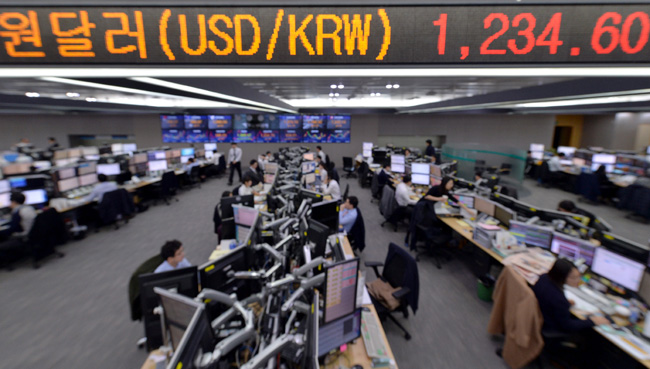- California Assembly OKs highest minimum wage in nation
- S. Korea unveils first graphic cigarette warnings
- US joins with South Korea, Japan in bid to deter North Korea
- LPGA golfer Chun In-gee finally back in action
- S. Korea won’t be top seed in final World Cup qualification round
- US men’s soccer misses 2nd straight Olympics
- US back on track in qualifying with 4-0 win over Guatemala
- High-intensity workout injuries spawn cottage industry
- CDC expands range of Zika mosquitoes into parts of Northeast
- Who knew? ‘The Walking Dead’ is helping families connect
Won plunges despite intervention

Foreign exchange dealers watch monitors at KEB Hana Bank in Seoul, Friday, when the won extended its decline to close at 1,234.4 won against the U.S. dollar, the lowest level since June 11, 2010. The Bank of Korea said Friday it will take every measure to prevent the won from fluctuating further against the dollar. (Korea Times photo by Seo Jae-hoon)
By Yoon Ja-young
South Korea’s financial authorities pledged Friday to take every measure to prevent the won from fluctuating further against the dollar and other major currencies.
“The won-dollar exchange rate has been fluctuating too widely recently,” the central bank said in a rare statement. “The Bank of Korea and the government are concerned about further rises in volatility. The financial authorities will take all necessary steps to help stabilize the foreign exchange market.”
The verbal intervention of the Bank of Korea (BOK) in the foreign exchange market came as the won fell to its lowest level against the dollar in five years and eight months.
On Friday, the won extended its decline, closing at 1,234.4 won against the dollar, the lowest level for the won since June 11, 2010, when it stood at 1,246.1. The won-dollar rate reached 1,239.6 at one point during the session.
Analysts said offshore investors bet heavily on the dollar, weakening the won. The won’s weakness only added to economic uncertainties instead of boosting exports, they said.
Ju Won, an economist at Hyundai Research Institute, said that a weaker won reflects unfavorable global factors. The pessimistic outlook released by the European central bank and Saudi Arabia’s objection to decreasing oil prices are leading to risk aversion in the market, they said.
Geopolitical worries on the growing tension between the Koreas are further weakening the won.
The government set off an alarm against possible terrorist attacks from North Korea, spooking investors, analysts said.
While pressuring the National Assembly to pass an anti-terrorism bill, the government said Thursday that there is an increasing possibility of a terrorist attack on the South by North Korea.
Ju said the market seems to be overreacting.
“Previously, the won-dollar rate rose above 1,200 only when the economy was facing serious troubles, such as the subprime mortgage crisis or foreign exchange crisis. The economy is currently in bad shape but I don’t think it is as bad as it was then,” he said. “There seems to be a psychological overshooting.”
Kim Doo-un, an economist at Hana Daetoo Securities, said the weak won is mostly due to the China factor.
“Korea, Japan and Taiwan are strongly tied to the Chinese yuan,” he said. “We expect the won/dollar rate could top 1,300 won as the China risks are likely to emerge again in the near future.”
A weak currency is supposed to boost a country’s exports by enhancing price competitiveness, but exports are continuing to decrease despite the cheap Korean won.
Korea’s exports dipped 18.5 percent in January from a year ago, marking the biggest plunge since August 2009.
Economists say that exports aren’t increasing due to the global economic slowdown and falling trade.
“A weak Korean won means it will have price competitiveness over other countries,” Ju said. “It will affect its market share, but right now, demand is falling globally. Korea is not the only one suffering falling exports.”
He added that it takes a considerable amount of time for the weakening of a currency to affect exports, citing the J-curve effect.
Kim at Hana Daetoo said that the rising won/dollar rate won’t help exports as much, as it means that import prices of components will rise.
Chung Yong-taek, an economist at IBK Investment and Securities, agreed. “It will be helpful as the Japanese yen is relatively strong, but the effect will be offset by the global economic downturn,” he said.
He recommended the government depreciate the won further. “By March, most countries will try to depreciate their currencies, with both the EU and Japan taking quantitative easing. Korea should take preemptive measures not to lose in the game.”
















